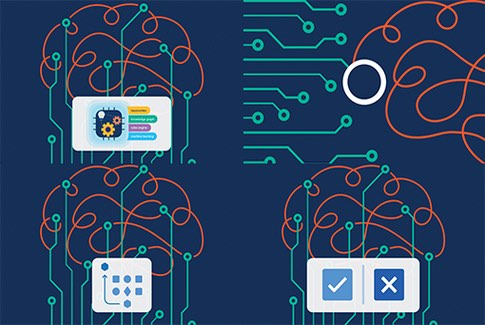
Artificial intelligence offers the enterprise unique opportunities to better structure, analyze and extract data to generate valuable business insights. However, organizations consistently struggle to address some of the core challenges to deploying enterprise-ready AI models.One that presents a persistent barrier is the skills gap between in-house talent and that required to implement and maintain AI systems.
Today, 93% of US and UK organizations consider AI a business priority, but 51% acknowledge that they don’t have the in-house talent to do it. O’Reilly’s AI Adoption in the Enterprise 2021 survey found 19% of respondents viewed lack of talent as a “significant barrier” to AI entry, topping the list of challenges. While there are millions of open roles in the AI field, there are only an estimated 300,000 AI professionals worldwide.
When you start to narrow down this already small pool of AI professionals to those with Python, SQL and cloud computing programming skills, you wind up with an extremely limited list of people who can execute complex AI initiatives. As a result, adopting and executing AI initiatives is extremely daunting, if not unrealistic, for most enterprise organizations.
Organizations invest in internal training, recruiting and other costly, time-consuming options to address their skill gaps. However, these measures are only part of the overall solution. Let’s explore how we bridge the gap.
How Companies Are Addressing the Skills Gap
The demand for AI talent centers around three core roles:
- Developers and engineers
- Researchers
- Data scientists
These roles serve the core functions of programming, database administration and cloud computing, among others.
While more than half of companies do not have the in-house talent to execute an AI or machine learning strategy, just 14% of companies feel confident they can find the right personnel in a timely manner, while 31% believe they can upskill their current staff in the tools and technologies they need to implement AI solutions. Not exactly encouraging responses to the skills gap.
As noted earlier, the supply of talent does not come close to meeting the demand for AI and machine learning skills. That forces companies to pay a premium to secure available talent. That price typically comes along with a significant investment toward marketing job listings and making them stand out from the noise. Recruiting is difficult in any competitive environment and AI is as competitive as it gets.
Rather than pursue existing talent, other companies aim to recruit students directly out of college. However, not all universities offer artificial intelligence programs and there is not a steady supply of AI-qualified graduates. As such, the skills gap cycle will likely persist for some time.
Bridging the Skills Gap with Accessible Technology
Between upskilling internally and recruiting externally, companies are left with inefficient and often impractical methods for sourcing AI talent. Until AI becomes more democratized as a technology, this will remain the status quo. Therefore, the future of AI has shifted to low-code or no-code technology.
AI platforms must cater to a broader talent pool, or organizations will continue to deliver the same subpar results. The expert.ai Platform offers a low-code solution for developers to build their own natural language models. Users can leverage the Platform’s hybrid approach to apply both machine learning and symbolic techniques to their models.
With this level of accessibility to traditionally complex technology, companies become far more capable of deploying enterprise-ready AI models.
Easy Project Activation
When you lack employees with a necessary skill set, starting an AI project feels like an impossible task. Where do you even begin?
Well, any successful AI initiative requires access to information and strong training data sets. With most platforms, that requires significant expertise. The expert.ai Platform, on the other hand, makes it easy to begin your AI journey, even for those without subject matter expertise.
With end-to-end language tools and intelligent data processing, the expert.ai Platform simplifies the training of your AI models. Intuitive tools provide comprehensive support for data annotation, labeling, model training, testing, and workflow orchestration, forgoing the need for data science expertise.
Meanwhile, intelligent data processing automatically extracts unstructured data trapped in sources such as PDFs, webpages and social media posts, eliminating the need for a trained expert. There is no need for document pre-sorting. Instead, the platform indexes and organizes data automatically, bypassing the need for manual data entry, cleanup or validation.
These tools make it simple for anybody to use enterprise resources to train AI models right out of the box. If you do have a subject matter expert in-house, collaborative tools allow that one person to lead a team of non-experts with the leveraged assistance of the platform — a boon for training staff in your AI platform. If you don’t have that expert in house, you still have the low-code and no-code tools at your disposal to simplify AI onboarding for anyone.
Promotes Internal Development of AI Skills
Skill development should always be important to employees. With that said, certain factors can be immensely helpful in motivating employees to take the next step. While low-code or no-code platforms may appear as a detractor to employees developing valuable programming skills, it actually can have quite the opposite effect.
Low-code and no-code platforms are an opportunity for less skilled employees to be exposed to complex AI technology that would previously be over their heads. This exposure not only helps them understand the features and functionalities of an AI system, but it gives them a taste of what they can accomplish via AI at a foundational level.
By experiencing some AI success early on, employees will be more eager to invest time into developing advanced skills. Plus, if they know that certain skills can only enhance success rather than impede it, they are more likely to view it as an opportunity than a burden. If you put employees in positions to succeed, you will find it far easier to bridge your skill gap.
Despite organizational demand for AI expertise, the talent pool remains thin when it comes to specific skill sets. This skills gap is a significant barrier that hamstrings enterprise efforts to build and deploy successful AI programs. As long as the demand outpaces the supply of available talent, the skills gap will continue to hinder organizations from making meaningful progress.
However, with a low-code solution such as the expert.ai Platform, AI projects become accessible and manageable by non-subject matter experts. This effectively lowers the barrier to AI entry for companies and makes the task of deploying a successful AI far more attainable. When more enterprises succeed in their AI initiatives, innovation spreads. That is something we can all get behind.


